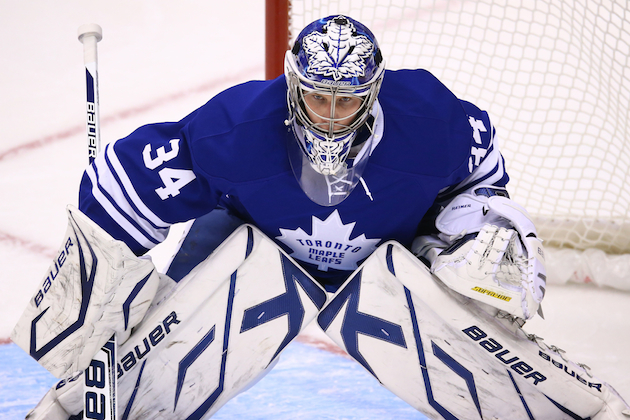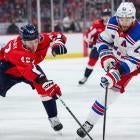
More NHL: Scores | Standings | Odds | Fight-O-Meter | League Leaders | Rumors
The Toronto Maple Leafs are back in the playoffs.
The team ended its nine-year postseason drought on Saturday night with a win over the Ottawa Senators, securing the team's first playoff appearance since 2003-04.
Now that they're in, the question becomes how far can they advance? Based on the way they've played this season history doesn't seem to be on their side. But then again, history wasn't really on their side when it came to actually making the playoffs. So who really knows with this team?
The Maple Leafs qualified for the postseason despite being outshot by an average of more than five shots per game this season, and this is a problem we've talked about more than once recently. It's the second-worst mark of any playoff team dating back to the 2000-01 season, with only the 2001-02 Montreal Canadiens finishing below them (that Montreal team was outshot by an average of 6.2 shots per game). That was the Montreal team led by goaltender Jose Theodore, who cleaned up the NHL awards that year, winning both the Vezina Trophy and Hart Trophy and getting the Canadiens into the postseason as the No. 8 seed, leading them to a first-round upset over the Boston Bruins. None of it happens without Theodore stopping nearly 94 percent of the shots he faced that year.
So why does getting outshot matter? It's a reflection of a team's ability to possess the puck, and possessing the puck is a key part of winning hockey games (this is a fantastic recent post from Canadiens blog Eyes On The Prize that illustrates just how important it is).
Dating back to the 2000-01 season teams that outshot their opponents during the regular season made the playoffs 78 percent of the time (133 out of 170), while teams that were outshot (42 out of 160) made the playoffs only 26 percent of the time. The higher the differential, the higher the postseason chances. The lower the differential, the lower the postseason chances.
The two tables below show not only what your chances of making the playoffs are based on your team's shot differential, but also where the recent Stanley Cup finalists and champions have come from.
| Playoff chances for outshooting your opponent: 2000-2012 | ||||||||
| Shot Differential | Playoff % | Stanley Cup Final Teams | Stanley Cup Champions | |||||
| 5 or more | 100% | 5 | 4 | |||||
| 4 | 86% | 5 | 4 | |||||
| 3 | 91% | 2 | 1 | |||||
| 2 | 67% | 3 | 0 | |||||
| 1 | 63% | 1 | 0 | |||||
| less than 1 | 70% | 3 | 1 | |||||
| Outshoot Totals | 78% | 19 | 10 | |||||
And now teams that get outshot:
| Playoff chances while getting outshot: 2000-2012 | ||||||||
| Shot Differential | Playoff % | Stanley Cup Finals | Stanley Cup Champions | |||||
| less than 1 | 34% | 0 | 0 | |||||
| 1 | 32% | 2 | 1 | |||||
| 2 | 28% | 0 | 0 | |||||
| 3 | 40% | 1 | 0 | |||||
| 4 | 5% | 0 | 0 | |||||
| 5 or more | 4% | 0 | 0 | |||||
| OutshotTotals | 25% | 3 | 1 | |||||
Before this season there were 23 teams since 2000 that were outshot by five or more shots during the regular season, and only one of them (the aforementioned Canadiens team) were able to qualify for the postseason.
The Maple Leafs will be the second such team.
So how will they do now that they're in? The recent of history of playoff teams to get outshot and make the playoffs isn't a particularly strong one. As the tables above show, if you want to reach the Stanley Cup Final and ultimately win it you'd better be able to control the puck and generate more shots than your opponent. A lot more.
The only team to get outshot over that stretch and win the Stanley Cup was the 2008-09 Penguins, and that was a tale of two teams. For the first half of the season they were coached by Michel Therrien and were badly outshot on most nights. Following the hiring of Dan Bylsma (and not to mention the trades for Chris Kunitz and Bill Guerin) they completely flipped the ice on teams and outshot their opponents by an average of three shots per game the rest of the way, and continued that trend into the playoffs until they defeated the Detroit Red Wings in the Stanley Cup Final.
The Leafs are just the 14th team since 2000 to make the playoffs while getting outshot by more than three shots. Teams with a shot differential of minus-3 or worse make the playoffs less than 20 percent of the time, and nearly all of them made the playoffs on the strength of their goaltending in the regular season (those teams had an average finish in the top five in the league in save percentage).
Naturally, those teams went as far as their goaltending could carry them in the playoffs.
Here's how they did:
| Playoff teams with worst shot differential since 2000-01 | ||||||||
| Team | Shot Differential | Save % Rank | Playoffs | |||||
| 2002-03 Minnesota Wild | -3 | 1st | Lost Conf. Final | |||||
| 2007-08 Philadelphia Flyers | -3 | 9th | Lost Conf. Final | |||||
| 2007-08 Minnesota Wild | -3.1 | 5th | Lost first round | |||||
| 2007-08 Pittsburgh Penguins | -3.1 | 4th | Lost Stanley Cup Final | |||||
| 2006-07 Calgary Flames | -3.2 | 7th | Lost first round | |||||
| 2011-12 Nashville Predators | -3.2 | 6th | Lost second round | |||||
| 2002-03 Toronto Maple Leafs | -3.3 | 8th | Lost first round | |||||
| 2009-10 Montreal Canadiens | -3.5 | 5th | Lost Conf. Final | |||||
| 2005-06 Nashville Predators | -3.5 | 1st | Lost first round | |||||
| 2006-07 Nashville Predators | -3.7 | 2nd | Lost first round | |||||
| 2010-11 Anaheim Ducks | -3.8 | 15th | Lost first round | |||||
| 2009-10 Colorado Avalanche | -4.2 | 11th | Lost first round | |||||
| 2013 Toronto Maple Leafs | -5.8 | 7th | To be determined | |||||
| 2001-02 Montreal Canadiens | -6.2 | 2nd | Lost second round | |||||
Good luck, James Reimer. You're probably going to need it.





















